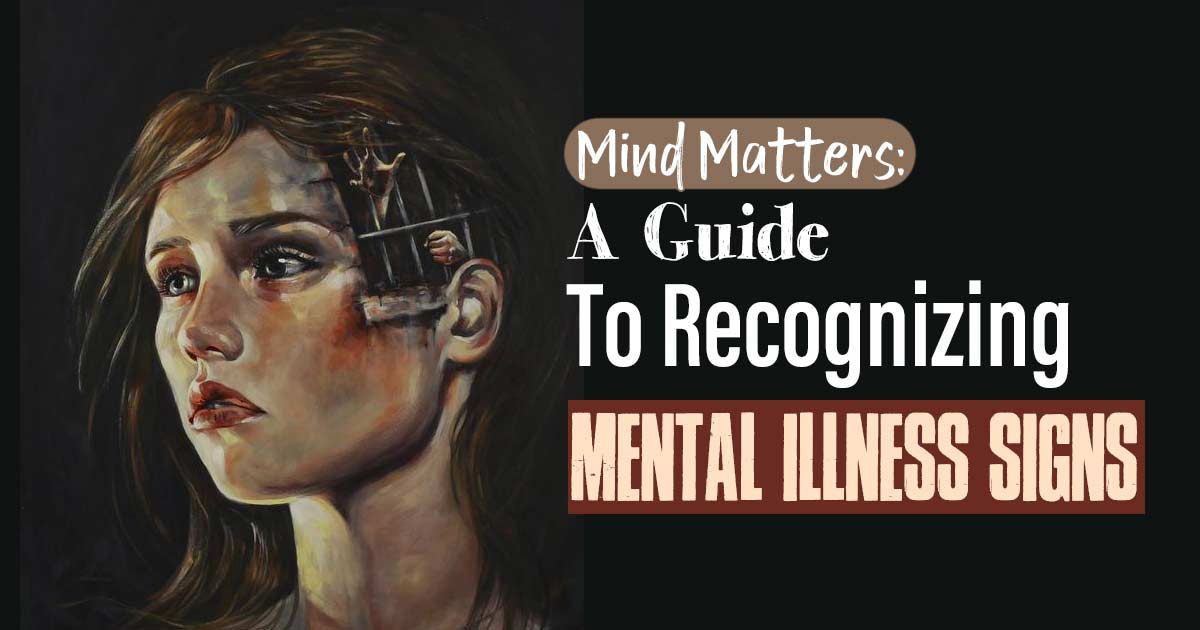Mental illness is a pervasive and often invisible crisis that affects millions of individuals worldwide. The World Health Organization estimates that one in four people will experience a mental health condition at some point in their lives.
Despite its prevalence, mental illness is frequently shrouded in stigma and misconceptions, which can hinder individuals from seeking help and support. Therefore, recognizing the signs of mental illness is of paramount importance.
Understanding Mental Illness
Before delving into the signs of mental illness, it is essential to understand what constitutes mental health and mental illness. Mental health refers to a state of emotional, psychological, and social well-being in which an individual can cope with stress, work productively, and contribute to their community.
Conversely, mental illness encompasses a wide range of conditions that affect one’s thinking, mood, and behavior. These conditions can vary in severity and include disorders such as depression, anxiety, schizophrenia, bipolar disorder, and post-traumatic stress disorder (PTSD), among others.
The Signs Of Mental Illness
Mental illness encompasses a wide range of conditions that affect a person’s thoughts, feelings, behavior, and overall mental well-being:
1. Changes In Mood And Emotion
One of the most prominent signs of mental illness is a noticeable shift in an individual’s mood or emotions. This can manifest as extreme sadness, irritability, excessive worry, or unexplained bouts of anger. For instance, persistent feelings of hopelessness, worthlessness, or emptiness may indicate depression, while sudden, intense anger outbursts could be a sign of bipolar disorder.
2. Social Withdrawal
People experiencing mental illness often withdraw from social interactions and isolate themselves from friends and family. They may lose interest in activities they once enjoyed, avoid social gatherings, and prefer to be alone. This withdrawal can contribute to a vicious cycle of loneliness and exacerbate their mental health issues.
3. Changes In Sleep Patterns
Sleep disturbances are common among individuals with mental illness. Some may struggle with insomnia, finding it difficult to fall asleep or stay asleep, while others may oversleep and experience chronic fatigue. These disruptions in sleep can have a profound impact on an individual’s overall well-being.
4. Changes In Appetite And Weight
Significant changes in appetite and weight can be red flags for mental health concerns. People with conditions like depression may lose their appetite and lose weight rapidly, while others may engage in emotional eating and gain weight. Such fluctuations can further impact an individual’s self-esteem and overall health.
5. Physical Symptoms
Mental illness can also manifest through physical symptoms such as headaches, stomachaches, and unexplained aches and pains. These symptoms are often a result of the mind-body connection, where emotional distress can manifest physically.
6. Difficulty Concentrating
Individuals with mental illness may struggle to concentrate, make decisions, or remember things. This cognitive impairment can hinder their ability to perform daily tasks, impacting their work, relationships, and overall quality of life.
7. Substance Abuse
Many people with mental health issues turn to substances like alcohol or drugs as a coping mechanism. Substance abuse can exacerbate mental health problems and create a vicious cycle of addiction and deteriorating mental well-being.
8. Suicidal Ideation
Perhaps the most alarming sign of mental illness is the presence of suicidal thoughts or behaviors. People who experience these thoughts may talk about feeling hopeless, express a desire to die, or engage in self-harming behaviors. Recognizing these signs is crucial for immediate intervention and support.
The Importance Of Recognizing Signs Of Mental Illness
Recognizing the signs of mental illness holds profound significance, impacting individuals, families, and society at large in several crucial ways. Timely recognition of mental health signs enables prompt intervention and treatment.
Addressing these conditions in their early stages often results in better outcomes, preventing symptom exacerbation and potentially saving lives. Individuals who receive timely support can experience a marked improvement in their overall quality of life.
Openly acknowledging and discussing mental health signs contributes to the destigmatization of these conditions, fostering a more accepting and informed society. It also empowers friends and family to provide vital support, strengthening relationships and creating a more supportive environment.
Additionally, early recognition helps mitigate the economic impact of untreated mental illness, reducing workplace productivity losses and healthcare expenses. Moreover, it aids in preventing crisis situations and, crucially, identifying signs of suicidal ideation, enabling immediate intervention and the potential to save lives.
Promoting Awareness And Education About Mental Illness
To effectively recognize the signs of mental illness, it is essential to promote awareness and education on this topic. Initiatives that aim to increase public knowledge about mental health, such as mental health first aid programs, can empower individuals to identify signs of mental illness and provide appropriate support.
Additionally, schools, workplaces, and healthcare institutions should prioritize mental health education and training. This can help create a more compassionate and informed society, where individuals feel comfortable discussing their mental health concerns and seeking help when needed.




























